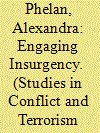|
|
|
Sort Order |
|
|
|
Items / Page
|
|
|
|
|
|
|
| Srl | Item |
| 1 |
ID:
168902


|
|
|
|
|
| Summary/Abstract |
The 2016 Peace Agreement between the Colombian government and the Revolutionary Armed Forces of Colombia—People's Army (the FARC-EP or FARC) commits to reforming political participation, especially of traditionally marginalized sectors throughout the country to consolidate Colombian democracy. While the Peace Agreement provides implementation mechanisms that support the insurgency's transition from armed group to political party, it also complements the FARC's political strategy that has traditionally maintained consistency. This article argues that the 2016 Peace Agreement has the potential to enhance democratic, political, and societal participation by engaging with FARC in two key ways—by attempting to reconcile key FARC grievances and containing specific mechanisms that increase participation of traditionally marginalized groups in Colombia. This article argues that the Agreement has impacted positively on FARC's political participation and given it incentives to pursue its political strategy democratically. Likewise, the Agreement has provided a positive-sum outcome for the Colombian government to strengthen its democratic legitimacy by placing emphasis on structural reform.
|
|
|
|
|
|
|
|
|
|
|
|
|
|
|
|
| 2 |
ID:
181742


|
|
|
|
|
| Summary/Abstract |
This paper argues that eudaemonic legitimation is a useful tool in understanding how insurgencies seek to justify their “effectiveness” and “performance” vis-à-vis the state in order to enhance authority and mobilise support for their strategic objectives. By examining primary FARC documents, conference and plenary findings, and select interviews with former and active FARC, ELN and M-19 members, it demonstrates how FARC constructed social contracts and integrated illicit financing into its operations as a strategy to appeal to its eudaemonic legitimation in its areas of proto-state influence, in turn aiming to mobilise support and consolidate a full-spectrum normative system. “Effectiveness” in FARC’s strategic approach through rule-setting allowed the organisation to expand to control significant portions of Colombian territory, which to a degree impacted positively on social mobilisation and challenged the government’s legitimacy by consolidating power structures in areas where there was a lack of government authority. FARC further appealed to social and economic “performance” by using revenue from its fundraising activities through engagement in the coca trade and kidnap for ransom to not only strengthen its military capacity, but also implement social initiatives and provide material goods. In turn, FARC was able to develop zones of security through the creation of social contracts in which stable economic practices were able to solidify, contributing in its effectiveness in providing proto-state authority and allowing for insurgent expansion.
|
|
|
|
|
|
|
|
|
|
|
|
|
|
|
|
| 3 |
ID:
190916


|
|
|
|
|
| Summary/Abstract |
A growing amount of literature is being devoted to interrogating gendered dynamics in both violent extremism and terrorism, contributing to the integration of international and feminist security. This includes how such dynamics can shape differences in the motivations and participation of women and men. By critically analysing ideological gender constructs in two women-only extremist forums – the Women's Forum on Stormfront.org and Women Dawah, a Turkish-language pro-Islamic State group chat on Telegram – and employing feminist methodology, this article demonstrates how gendered online spaces influence women's ‘everyday practices’ within extremist movements. We argue that women-only online spaces not only facilitate gendered practices by allowing women to share everyday experiences, hold ideological discussions, and engage in debate, but also provide an important means to navigate these issues within the movement itself. In fact, women-only forums are actively used by women within extremist movements to exert greater agency in the face of otherwise constraining gendered ideological constructs. In turn, gendered everyday practices are reinforced by virtual communities that strengthen a sense of meaning – and purpose – in the movement, albeit being ideologically confined to the private sphere in many ways. This study sheds light not only on the differences in participation between women and men, but also on how such virtual communities can serve as spaces to frame and reinforce gendered practices in extremist movements. This has key implications for deradicalisation and disengagement strategies, which are at present overwhelmingly gender neutral. We provide evidence of how women navigate agency in these spaces, while challenging the stereotype that women in extremist movements are typically passive actors confined to traditional roles.
|
|
|
|
|
|
|
|
|
|
|
|
|
|
|
|
| 4 |
ID:
191453


|
|
|
|
|
| Summary/Abstract |
This special issue encourages a greater integration of gender-sensitive approaches to studies of violent extremism and terrorism. It seeks to create and inspire a dialogue by suggesting the necessity of incorporating gender analysis to fill gaps within, and further enhance, our understanding of political violence. In this introductory essay, I argue that there have traditionally been four approaches to understanding the interplay between gender and terrorism– positivist or “gender-as-a-variable”, instrumentalist, gendered motivations, and gender-based analysis and/or feminist methodology. Terrorism, Gender and Women: Toward an Integrated Research Agenda intends to advance a discussion of new ways in understanding how women and men can be affected by terrorism and violent extremism differently, and how involvement can often be influenced by highly gendered experiences and considerations.
|
|
|
|
|
|
|
|
|
|
|
|
|
|
|
|
|
|
|
|
|